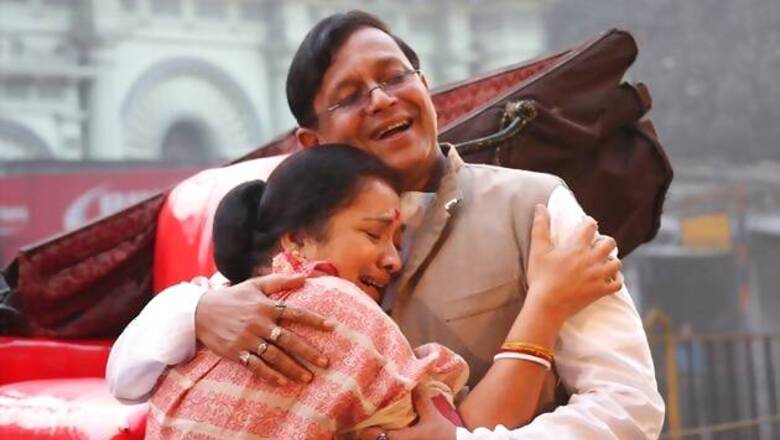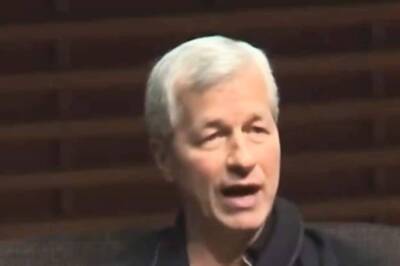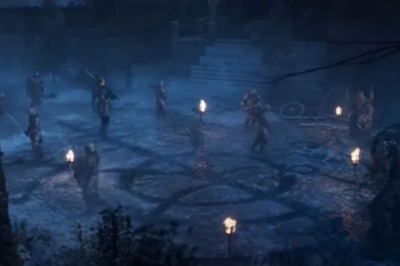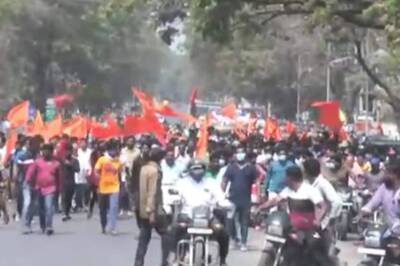
views
Shukno Lanka tackles a subject rarely explored in Bengali cinema – the junior artiste. The title is a metaphor for the junior artiste who, like a dry red chilli which Shukno Lanka translates to, is mandatory in every Indian dish/film but is neither recognised nor appreciated.
Chinu Nandy (Mithun Chakraborty) is a junior artiste for around 30 years. His life is one long struggle hopping into a tramcar to knock at studio doors looking for work to be gained through humiliation, oppression and insults. His life with wife Bela (Angana Sen), a content couch-potato in a small one-room flat in a dingy bylane where the local youth keeping ragging Chinu mercilessly, is like a refreshing balm that smoothes the pains away.
One fine day, internationally renowned filmmaker Joy Sundar Sen (Sabyasachi Chakraborty) takes him to play the lead in Parash Pathar, an adaptation of a short story authored by filmmaker Ritwik Ghatak.
The parallel track unfolds Joy Sundar’s life as filmmaker, his platonic friendship with Australian actress Isabella (Emma Brown) and his troubled relationship with wife Jhilik (Debasree Roy) who he ignores to the extent that for him, she does not exist.
One night, Chinu Nandy hires a landau and sets off with Bela on a ride to pour his heart out, telling her things he never did before, including his elevation as hero in a film directed by Joy Sundar Sen. This is the strand that binds the two layers of the story and also unfolds episodically in flashbacks, the story of Chinu’s life.
The landau ride tends to drag at times till we realise what the ride was leading to.
Shukno Lanka is a model lesson on some best acting we have seen recently in Bengali cinema. Mithun Chakraborty proves again that he is, perhaps, the best actor in the country today who puts everything and some more, into every role he plays, be it a pop masala film like Tulkalaam or a surrealistic exercise like Buddhadeb Dasgupta’s Kaalpurush. He touches the character of Chinu Nandy as if with a magic wand and abracadabra, we see Chinu Nandy and not Mithun Chakraborty. The only negative point is the imperfect East Bengali dialectic diction he uses in his conversations with his wife.
Sabyasachi Chakraborty infuses Joy Sundar Sen with the self-indulgent arrogance his fame, talent and power have given him, spelt out in his body language, speech, attitude and treatment of Chinu. He never lets Chinu forget that he is, after all, a junior artiste. The way he treats his wife marks only a difference in degree. With Isabella however, he remains friendly because there is a quid pro quo involved.
Debasree Roy gives one of the best performances of her career, filling it with an entire range of emotions from begging, to persuading, to breaking down, to desperate anger.
Emma Brown as Isabella is soft, low-key and in control, not allowing her infatuation for the director to show.
Angana Sen as Bela is natural and sweet. There is a lovely family scene where the neighbourhood has gathered in their small room to watch Chinu being interviewed on a television channel and Chinu shooing them to silence when they begin to comment.
The most telling scene is when at the end of the landau ride, Chinu drags his wife down to point out at a huge hoarding of the film above, sporting a blow-up of his face but without his name in the credits.
The late Kunal Mitra does a mind-blowing cameo as a superstar. The characterizations of the two superstars are a bit caricaturized and exaggerated.
Mahesh Aney’s cinematography, especially as the landau rides down the streets of Kolkata from night till day break, enriched with Debajyoti Mishra’s melodious musical score with the beat of the horse’s hoofs keeping time, makes for beautiful cinema.
Indranil Ghosh’s art direction is very good in its detailing and its authenticity, as locations keep shifting from Chinu’s flat and neighbourhood to the studio compound, to the shooting floors, the superstar’s air-conditioned van, Joy Sundar’s spic-and-span apartment, et al.
But Jhilik’s sudden breaking into a dance number rings false and forced as does her scene of pouring her heart out in the studio.
Kudos to writer-director Gaurav Pandey for being able to pull off a difficult film with a story that does not have young romance, song-and-dance scenes shot on foreign locations, graphic violence, and not even the conventional hero, heroine and villain. But then, Shukno Lanka is not for the masses.
Critic: Shoma A. Chatterji

















Comments
0 comment